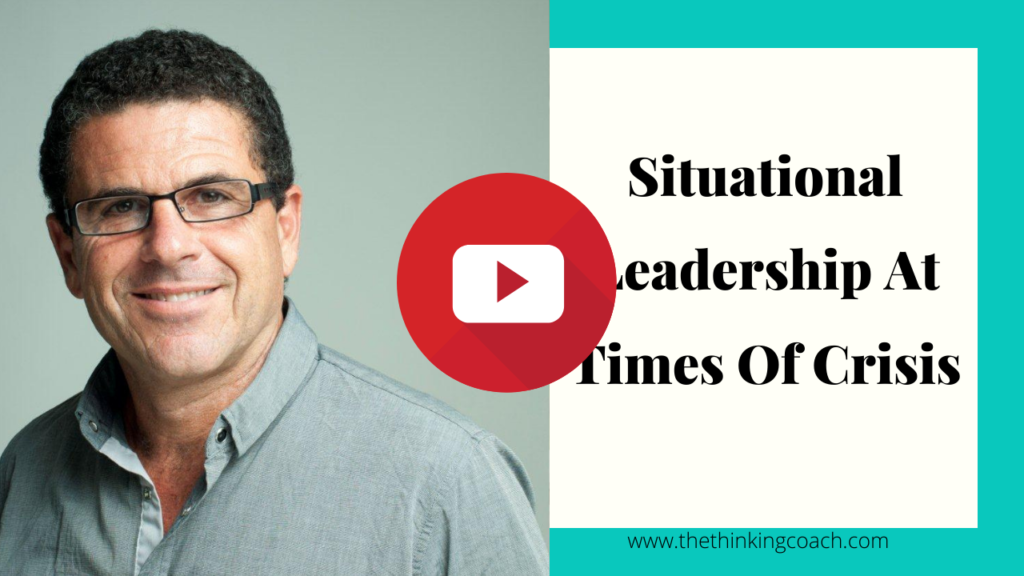Table of Contents
What is Situational Leadership & why is it so important to have at times of crisis?
Everything changes at times of crisis and the skills of situational leadership have all the leadership characteristics that are needed to guide a ship through troubled waters.
This article will look at situational leadership as a catalyst to successfully transition from one reality to a new reality while equating perceptions with facts and demonstrating the leadership characteristics that provide people with trust and safety.
Understanding What Situational Leadership Is About

Situational leadership has the leadership characteristics that respond to the needs of the moment, which means it’s flexible and changes according to needs and fitting the right leadership style to a particular group of people, their needs, what they are facing, and the nature of the times.
The following is a list of leadership characteristics that are associated with situational leadership. Each of them requires training of a special kind.
Training that teaches and explains but most importantly feels as feelings of skill give the best possibility to put the skill to practice.
Here is a situational leadership skill list:
- Flexibility & adaptability
- Participatory skills
- Research & questioning skills
- Prudence
- People-Oriented person
- Delegating
- Trusting
- Communicating, listening
- Inquiring
- Non-assuming
- Integrity
- Courage
- Emotional Intelligence
- Separating facts from fiction
…and other leadership skills
Above all, situational leadership endeavors to be truthful to the facts in a neutral way without allowing the bias of yesterday’s perception to take over.
It must be remembered that past perception has more power to influence actions than current facts.
The danger is that the facts & biased perceptions of the facts can be worlds apart, as we can see in these days of Corona, where it seems that truth has no space to appear.
Situational leadership must be vigilant in protecting the truth from the unfitting and dangerous perceptions that are biased to a point where they can prevent the truth from appearing.
Situational Leadership Training

This training focuses on soft skills by 90%, while learning to have leadership characteristics such as courage that is able to show the way ahead.
The meaning of pioneering a new way of proceeding in the organization that holds high value for people and their needs.
This is based on the premise that your most important leadership is inwardly-focused to your own organization, which will be your “base camp” for outward leadership.
It’s a specialty training that brings forth leadership characteristics that enable a leader to Lead By Example while adapting “on the run” to changes.
There must be the ability to make wise decisions and have critical thinking skills that can evaluate what is the most important aspect that needs attending to.
Soft skills seminars are needed to elevate the health levels of organizations, which are mostly ailing in human to human skills.
Everyone needs them from the leadership downwards to the rest of the organization.
However, to achieve situational leadership they are a must.
They should be carried out by a trained and experienced professional such as the Thinking Coach, who is extremely qualified and experienced as The Life Coach For The Pros.
Evaluating Situational Leadership Training

Most things today are evaluated quantitatively with very little consideration given to qualitative evaluation.
Evaluation of both, quality & quantity needs to work in tandem 50%-50%, but there’s a great imbalance,(96% – 4%) in favor of quantity, which causes the decision-making process to be off the mark.
Qualitative evaluation is based on the concept of “success in process” frame of mind. Whereas, quantitative evaluation tends to be short-term, tactical, with bottom-line, hard, quick results mindset orientation.
Incidentally, those who claim the leadership characteristics of being result-oriented are the ones that err the most, because a true result-oriented situational leadership will always think “success in process” and would make sure that qualitative considerations have their say.
Quantitative evaluation could be likened to giving a hungry person a fish to eat, whereas qualitative evaluation will provide the hungry person with the training of how to fish for themselves.
It is impossible to measure the effects of soft skills training programs on an immediate basis.
Here are some of the soft skills training necessary for situational leadership and the workforce in corporate training seminars:
• Building cohesive teams
• Strategic Communication
• Long-term Strategic Thinking & Strategic Planning
• Emotional Intelligence
• Mastering the Decision-Making Process
• Creative Thinking Out of the BOX
• Creating A Human Sensitive Business Environment with attributes such as:
-
- Persistence
- Self-discipline
- Patience
- Humbleness
- Courage
- Encouragement
- And, of course, Charisma (Leadership By Example!!!)
Note: many studies show that 90% of firing is due to a lack of soft skills training and only approximately 10% are due to lack of domain skills!
Yet, companies invest only 10% of their training budget in long-term oft skills training that contribute to situational leadership and 90% on hard skills training.
Why is Situational Leadership The Exception Rather Than The Rule

The leadership characteristics that situational leadership requires are unique these days because the concept of leadership focuses on overpowering everything and everybody to seemingly bring immediate results.
The nature of immediacy places wrongful expectations on the leadership which in turn creates stress and prevents the concept of “success in process” becoming the leadership vision.
Self Leadership as a Key to Situational Leadership
Self-leadership is the ability to personally develop as a leader and cause your own personal life to be your training platform for your business life.
It, therefore, requires 2 main aspects of training:
1. The Outside/ Inside part, that is taught by a professional in a training setting, where they receive the knowledge, the workshop sensation, the in-class experience, the seed of the lesson, the vitamin of the skill. And the leadership characteristics that belong to situational leadership.
2. The Inside / Outside part, which is self-taught by putting that knowledge to practice, fertilizing the sown seed by their own efforts, releasing the vitamin of the skill by its usage and spread.
You can teach a person extremely valuable skills but unless they practice them and apply them in their day-to-day operations they’ll never actually “get it” and it will stay as sterile knowledge.
Moreover, unless they use what they learned, that knowledge will fade in time.
Once the knowledge is applied the professional is now getting the real lessons they couldn’t get in the training setting and it turns the knowledge to intelligence (In-tell-i-gence)
I have met quite a few personnel in leadership positions who fool themselves by thinking that because they learned something intellectually they have the intelligence of it.
You gain the intelligence by your efforts and the “blood sweat and tears” you put into it. That is when you start to lead others By Example.
Does The Organization Have A Progressive Policy of Tolerance to First-Time Mistakes?

Why is this question relevant?
Well, simply put, unless people feel that they can make mistakes without being punished, they’ll seldom put to practice new soft skills.
They can never be creative, and if the environment is controlled by the fear.
In other words, Situational Leadership must see to it that the leadership characteristics that are exhibited throughout the organization treat mistakes as an improvement mechanism rather than as a tool of punishment.
If people feel they are being punished for first-time mistakes they will never be creative or take ownership.
The Nature Of Situational Leadership Seminars

In such corporate training seminars, a new level of “Motivation to Succeed” would be present.
A kind of training in which, both, the trainer and the trainees take responsibility for the success of the process.
The trainer himself needs to be a leader, conducting a live, updated teamwork seminar, where people can have their input and share in the success of the training.
The participants must WANT to be there for a greater reason than just for their own success. When the motive is bigger than just “Me, Me, Me”, than the range of excellence is much greater.
The material has to be practical and real, beyond just nice words that are soon forgotten.
The new knowledge must be practiced in a safe and supportive training environment, where the Emotional Intelligence level contributes to the self-confidence and enthusiasm of the participants.
An organization that wants to develop situational leadership must understand once and for all that people are people and not robots!
Finally
In these urgent times, the leadership characteristics that typify situational leadership are the very leadership traits that can lead people in times of crisis and provide for stability which enables functionality at a level that can gradually build trust.
That’s the kind of leadership that is needed now. One that unites one that does not take advantage of the weakness of others and divides them to make them weaker. One that empathizes, one that has a greater purpose than just them.
I have had a military and organizational leadership experience that taught me that we are always at times of change and thus situational leadership with its leadership characteristics was my choice and venue
Anything else would not meet the needs of the moment and the people in my care.
My operative decisions needed to rely on true needs, on facts, on genuine input of my reports, and not a bunch of YES men who tried to please me.
For me, situational leadership was a matter of life or death and thus I learned to hear, to see, to think, to care, to empathize, to listen, to build trust, to build a cohesive team, to be on the ball…and so I am alive!
Contact me for professional training seminars that make a difference:
Eli Harari
The Life Coach for Professionals™
Image Source: Pexels, Pixy, NeedPix, Pixabay, Pikist



Pingback: The Rat Race or The Art of Care? The Depth Of Strategic Thinking